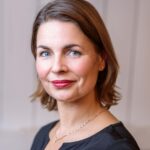That’s how we do it, to survive
On the second day of the multi-day workshop, she checked in and told me that she had slept poorly. That wasn’t new to her, but what was new, was that she had been tossing and turning, thinking about what kind of question she wanted to bring in for the constellation. And all that tossing and turning had not brought clarity, but had only resulted in fatigue and frustration. She decided to just get going then, and just start with the installation.
She told us that she often felt anger, anger at the world, at the people around her, at the biggest tasks at hand in, for example, youth care and refugee care. Anger at everything that was not being done, at everything that she would then have to do. It had brought her to the point of burnout. And besides, she felt alone. And she realized that that anger, those quick judgements were getting in the way of connecting with people. While she wanted connection. And that she would then get angry again, all of a sudden. She now feels uneasy, about what she’s bringing in now. And she wonders if I can handle all of that, whether I can work on her issue. Whether I am good enough. Whether the group of participants is willing to work on it. And she wants to connect with people.
Breathe in, breathe out.
“Have you actually accepted life?” I ask. Her body reacts as if stung by a wasp. Time to bite the bullet, go all in. I ask her to invite a representative for Life and she does. This representative stands about 2-3 meters in front of her and looks at her kindly. She does not look back, cannot really look at Life. We take our time. I ask her to look anyway, just from her chair, sitting next to me. And she does, and her body responds strongly. I am allowed to touch her, so that she can physically feel bedding and groundedness. Tears flow. And her body becomes calmer.
Behind the representative for Life, I set up two representatives for the parents, and behind them four for the grandparents, and behind them another row for the great-grandparents. We look at a whole range of generations. She stands in front of them and looks at them. And the generations also start to cry. Something almost like connection occurs, and then it happens: some of the representatives in the generations turn away. They turn away from Life, turn away from her, turn away from the opportunity for connection.
And I suddenly say: “That’s how we do it, to survive.” And she repeats, several times: “That’s what we humans do: we survive.” Slowly, the representatives turn around towards her again. Slowly, there is connection and peace. The recognition of this strong survival mechanism, without condemning it, makes it possible.
She turns around and stands next to Life and they lock arms, with the range of generations behind her. After having stood like that for some time, we end this constellation.
The next morning, she overslept, after having slept for 10 hours without waking up. She looks like a different person. She says she still feels the generations behind her and Life beside her. Her intention is that when she feels angry at or disappointed in other people, she will first say to herself “That’s what we humans do: we survive.” And she resolves to learn to live, rather than survive.
Want to learn more about systemic work and constellations?
Knowledge
Books, blogs and videos: our trainers are happy to share their knowledge, experience and insights on systemic work.
About BHI
The Bert Hellinger Institute is your training, knowledge and research centre for systemic work. Find out more about our team, locations and history.
FAQs
Are you new here or is something not clear? Check out the FAQs about systemic work in general or the Bert Hellinger Institute.
Subscribe to our newsletter
We send the latest blogs, vlogs and our course offerings monthly through our newsletter. Stay informed and subscribe.
SubscribeAbout the Bert Hellinger Institute
People are constantly evolving. With each other, without each other. In families, in teams, in organizations. Systemic thinking makes us aware of the “why” of our being and doing. Organizational and family constellations create room for movement. The BHI provides courses, workshops and training programs in the field of systemic work, constellations, leadership and coaching. This is how we contribute to the development of people, organizations and society.

